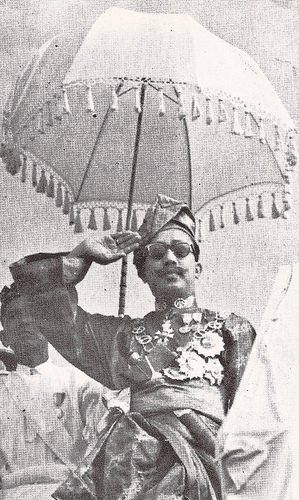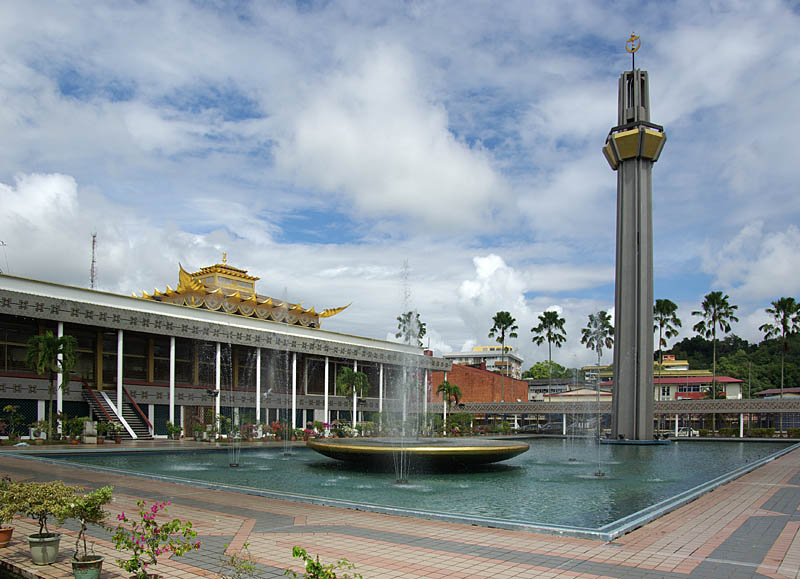|
Order Of Setia Negara Brunei
The Most Blessed Order of Setia Negara Brunei ( ms, Darjah Setia Negara Brunei Yang Amat Bahagia), also translated as The Most Blessed Order of Loyalty to the State of Brunei, is an order of Brunei. It was established on 29 November 1959 by Sultan Omar Ali Saifuddien III Sultan Sir Omar Ali Saifuddien Sa'adul Khairi Waddien ( Jawi: ; 23 September 1914 – 7 September 1986) was the 28th Sultan of Brunei, reigning from 4 June 1950 until his abdication from the throne on 5 October 1967. He was also Brunei's fir .... The order consists of four classes: References Orders, decorations, and medals of Brunei Awards established in 1959 1959 establishments in Brunei {{orders-medals-stub ... [...More Info...] [...Related Items...] OR: [Wikipedia] [Google] [Baidu] |
Sultan Of Brunei
The sultan of Brunei is the monarchical head of state of Brunei and head of government in his capacity as prime minister of Brunei. Since independence from the British in 1984, only one sultan has reigned, though the royal institution dates back to the 14th century. The sultan of Brunei can be thought of as synonymous with the ruling House of Bolkiah, with generations being traced from the first sultan, temporarily interrupted by the 13th sultan, Abdul Hakkul Mubin, who in turn was deposed by a member of the House of Bolkiah. The sultan's full title is His Majesty The Sultan and Yang Di-Pertuan of Brunei Darussalam. Sultans Uncertainties The earliest historical record of the Sultans of Brunei is not clearly known due to the poor early documentation of Brunei history. In addition there has been an effort to ''Islamise'' the history, with the "official history" not matching up with verifiable foreign sources The ''Batu Tarsilah'' - the genealogical record of the kings of Brun ... [...More Info...] [...Related Items...] OR: [Wikipedia] [Google] [Baidu] |
State Order
A state order, or national order, is an order bestowed by a sovereign state as part of a national honours system.https://www.pressreader.com/lebanon/the-daily-star-lebanon/20180724/281573766486143 These orders, conferred for the merit of the recipient(s), are typically categorised as either orders of chivalry or orders of merit. The equivalent of orders bestowed by formerly reigning royal dynastic families are called dynastic orders. See also * State decoration * Dynastic order A dynastic order, monarchical order, or house order is an order under royal patronage. Such an order is bestowed by, as a legitimate , a sovereign or the head of a once-sovereign ruling family. These are often considered part of the cultural pat ... References Orders, decorations, and medals * Public administration {{Orders-medals-stub ... [...More Info...] [...Related Items...] OR: [Wikipedia] [Google] [Baidu] |
Brunei
Brunei ( , ), formally Brunei Darussalam ( ms, Negara Brunei Darussalam, Jawi alphabet, Jawi: , ), is a country located on the north coast of the island of Borneo in Southeast Asia. Apart from its South China Sea coast, it is completely surrounded by the Malaysian state of Sarawak. It is separated into two parts by the Sarawak district of Limbang District, Limbang. Brunei is the only sovereign state entirely on Borneo; the remainder of the island is divided between Malaysia and Indonesia. , its population was 460,345, of whom about 100,000 live in the Capital city, capital and largest city, Bandar Seri Begawan. The government of Brunei, government is an absolute monarchy ruled by its Sultan of Brunei, Sultan, entitled the Yang di-Pertuan Negara, Yang di-Pertuan, and implements a combination of English common law and sharia law, as well as general Islamic practices. At the peak of the Bruneian Empire, Bolkiah, Sultan Bolkiah (reigned 1485–1528) is claimed to have had contro ... [...More Info...] [...Related Items...] OR: [Wikipedia] [Google] [Baidu] |
Catholic Church
The Catholic Church, also known as the Roman Catholic Church, is the largest Christian church, with 1.3 billion baptized Catholics worldwide . It is among the world's oldest and largest international institutions, and has played a prominent role in the history and development of Western civilization.O'Collins, p. v (preface). The church consists of 24 ''sui iuris'' churches, including the Latin Church and 23 Eastern Catholic Churches, which comprise almost 3,500 dioceses and eparchies located around the world. The pope, who is the bishop of Rome, is the chief pastor of the church. The bishopric of Rome, known as the Holy See, is the central governing authority of the church. The administrative body of the Holy See, the Roman Curia, has its principal offices in Vatican City, a small enclave of the Italian city of Rome, of which the pope is head of state. The core beliefs of Catholicism are found in the Nicene Creed. The Catholic Church teaches that it is the on ... [...More Info...] [...Related Items...] OR: [Wikipedia] [Google] [Baidu] |
Chancellor
Chancellor ( la, cancellarius) is a title of various official positions in the governments of many nations. The original chancellors were the of Roman courts of justice—ushers, who sat at the or lattice work screens of a basilica or law court, which separated the judge and counsel from the audience. A chancellor's office is called a chancellery or chancery. The word is now used in the titles of many various officers in various settings (government, education, religion). Nowadays the term is most often used to describe: *The head of the government *A person in charge of foreign affairs *A person with duties related to justice *A person in charge of financial and economic issues *The head of a university Governmental positions Head of government Austria The Chancellor of Austria, denominated ' for males and ' for females, is the title of the head of the Government of Austria. Since 2021, the Chancellor of Austria is Karl Nehammer. Germany The Chancellor of Germany, denomina ... [...More Info...] [...Related Items...] OR: [Wikipedia] [Google] [Baidu] |
Order (decoration)
An order is a visible honour awarded by a sovereign state, monarch, dynastic house or organisation to a person, typically in recognition of individual merit, that often comes with distinctive insignia such as collars, medals, badges, and sashes worn by recipients. Modern honour systems of state orders and dynastic orders emerged from the culture of orders of chivalry of the Middle Ages, which in turn emerged from the Catholic religious orders. Terminology The word order ( la, ordo), in the case referred to in this article, can be traced back to the chivalric orders, including the military orders, which in turn trace the name of their organisation back to that of the Catholic religious orders. Orders began to be created ''ad hoc'' and in a more courtly nature. Some were merely honorary and gradually the ''badges'' of these orders (i.e. the association) began to be known informally as ''orders''. As a result, the modern distinction between ''orders'' and ''decorations'' or ''ins ... [...More Info...] [...Related Items...] OR: [Wikipedia] [Google] [Baidu] |
Sultan Omar Ali Saifuddien III
Sultan Sir Omar Ali Saifuddien Sa'adul Khairi Waddien ( Jawi: ; 23 September 1914 – 7 September 1986) was the 28th Sultan of Brunei, reigning from 4 June 1950 until his abdication from the throne on 5 October 1967. He was also Brunei's first Minister of Defence after the country's independence. He was known as "The Architect of Modern Brunei",, "The Royal Poet", and "The Father of Independence". During his reign, 3 chief ministers was appointed according to the Constitution. They were Ibrahim Mohammed Jaafar, Marsal Maun, and Yura Halim. Early life and education Pengiran Muda Omar Ali Saifuddien was born at Istana Kota, Kampong Sultan Lama, Brunei Town on 23 September 1914. He was the second son of Muhammad Jamalul Alam II and Raja Isteri Fatimah. Omar Ali Saifuddien, under the behest of his British mentor and father-figure Sir Roland Evelyn Turnbull, studied at the Malay College Kuala Kangsar (MCKK) in Perak, British Malaya from 1932 to 1936. As a result, he was the fir ... [...More Info...] [...Related Items...] OR: [Wikipedia] [Google] [Baidu] |
Post-nominal Letters
Post-nominal letters, also called post-nominal initials, post-nominal titles, designatory letters or simply post-nominals, are letters placed after a person's name to indicate that the individual holds a position, academic degree, accreditation, office, military decoration, or honour, or is a member of a religious institute or fraternity. An individual may use several different sets of post-nominal letters, but in some contexts it may be customary to limit the number of sets to one or just a few. The order in which post-nominals are listed after a name is based on rules of precedence and what is appropriate for a given situation. Post-nominal letters are one of the main types of name suffix. In contrast, pre-nominal letters precede the name rather than following it, such as addressing a physician or professor as "Dr. Smith". List Different awards and post-nominal letters are in use in the English-speaking countries. Usage Listing order The order in which post-nominal lette ... [...More Info...] [...Related Items...] OR: [Wikipedia] [Google] [Baidu] |
Malay Styles And Titles
The Malay language has a complex system of Style (manner of address), styles, titles and honorifics which are used extensively in Brunei, Indonesia, Malaysia, Singapore, and the southern Philippines. Brunei, Malaysia, Singapore and several Provinces of Indonesia, provinces in Indonesia regularly award honorary and life titles. What follows in this article is specific to the Malaysian system. References to Brunei and Indonesia are given when pertinent. In Malaysia, all non-hereditary titles can be granted to both men and women. Every title has a form which can be used by the wife of the title holder. This form is not used by the husband of a titled woman; such a woman will bear a title which is the same as a titled man. Former use Singapore, whose Malay royalty was abolished by the Singapore in the Straits Settlements, British colonial government in 1891, has adopted civic titles for its leaders. The Philippines historically used Malay titles during its History of the Philip ... [...More Info...] [...Related Items...] OR: [Wikipedia] [Google] [Baidu] |
Orders, Decorations, And Medals Of Brunei
The orders, decorations, and medals of Brunei consist of (translatable as 'state decorations') and (literally 'medals of honour'). Both are awarded by the Sultan of Brunei on the basis of merit, especially on the contributions to the country. The investiture of some of the state decorations also include the conferment of titles, whereby they become part of the awardees' personal names in official correspondence or when mentioned in formal media in the country. The decorations and medals are under the responsibility of , a government department under the Prime Minister's Office, which also oversees Bruneian royal traditions and protocol. The insignia are displayed in the Royal Regalia Museum located in the capital. Investiture The actual investiture involves awardees being given badges in a ceremony by the Sultan or sometimes the Crown Prince upon the Sultan's discretion. The ceremony is traditionally held in Lapau which is a type of ceremonial hall for royal ceremonies in t ... [...More Info...] [...Related Items...] OR: [Wikipedia] [Google] [Baidu] |
.jpg)


